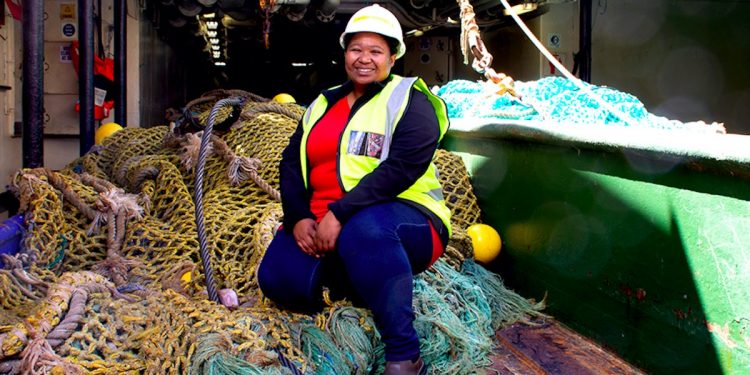Someone who has personal experience of the opportunities that exist in fishing is Lucinda Krige, the first woman to qualify as a chief engineer in the South African fishing industry.
She was working as a chambermaid in a Cape Town hotel when she read of an opportunity to train at sea as an engineering cadet. Knowing that this was her chance to achieve a lifelong ambition of working as an engineer, she applied for the position.
‘I didn’t know much about life at sea – I’m the first in my family to work in the fishing industry – but I applied, I got the job and when I got into Sea Harvest and I got to know what marine engineering is all about, I discovered this is actually the career I was looking for and I didn’t even know it,’ she said.
‘The vessels are technologically so advanced. There’s a lot of electronics behind the scenes that aid with navigation and trawling, and that is something that you also need to maintain and accommodate.’
It took Lucinda Krige five years of theoretical training and work experience to secure a chief engineer’s qualification. On almost every ship she sailed she was the only woman on board and she says she received phenomenal tuition, support and encouragement from her male colleagues, especially the engineers, skippers and mates she worked with.
‘Working in a male-dominated environment wasn’t intimidating to me. I just slotted in,’ she recalls.
Eleven years after qualifying as a chief engineer, she has now swapped her engineer’s overalls for a shore-based job in the learning and development department at Sea Harvest’s Saldanha Bay plant. She is responsible for maritime and technical training for Sea Harvest employees, as well as the training of approximately 40 apprentices.
‘With my engineering background, I just hit the ground running when it came to learning and development because the fields that I’m responsible for now are actually just an extension of the work I did at sea,’ she said.
Lucinda Krige strongly encourages young people who want to follow a career in engineering to consider marine engineering because it encompasses such a broad spectrum of disciplines – from mechanical to electrical engineering, hydraulics and pneumatics and electronics.
‘It is my privilege to tell people about the amazing scope for career progression that exists in the fishing industry,’ she said.
Sea Harvest is one of 33 companies active in the South African deep-sea trawling industry which produces sustainable, MSC-certified hake for local and export markets. The fishery provides 7300 jobs with regular wages and employee benefits, and it delivers R6.7 billion to the South African economy every year.









